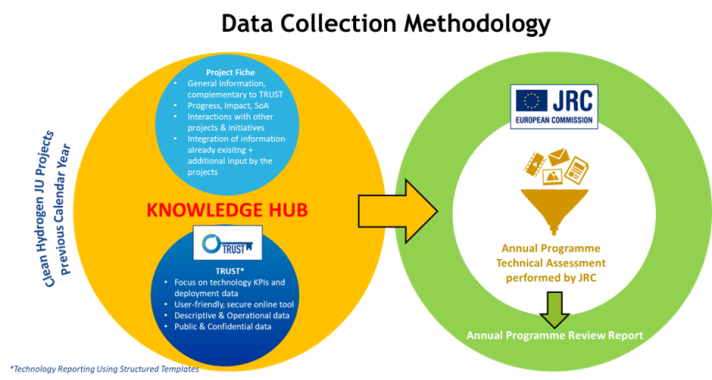Data Collection Methodology

The annual data collection exercise from projects is performed via the Knowledge Hub data collection tool, an internal platform that aims to collect qualitative and technology related project information. The platform replaced the previously used data collection platform TRUST (Technology Reporting Using Structured Templates) to collect the technology-related information, complemented by the Project Fiche platform via containing mostly qualitative information. Projects are invited to provide their data in Year N concerning results generated in Year N-1.
Data collected allow the benchmarking of the technology progress reported by the projects against the SoA and the Clean Hydrogen JU targets, as defined in the SRIA. Moreover, the annual iterations of the data collection exercise provide the necessary input for the development of a database of project results over time.
The Data Collection exercise constitutes a crucial element of the Programme Review exercise and the ability of the Clean Hydrogen JU to report on its significantly increased monitoring and reporting obligations brought with the Horizon Europe Programme. The continuous reporting performed by the projects is not sufficient for this purpose, as it focuses mostly on data related to resources and actions – reflecting the Horizon Europe KPIs – but not touching technology progress and outcomes, which are linked to the Clean Hydrogen JU KPIs. Nevertheless, the JU tries to minimise overlaps and avoid requesting the same information twice from the projects.
Public (non-sensitive) / Confidential (sensitive) data
The Clean Hydrogen JU is committed to respect data confidentiality (according to the conditions setup by the Grant Agreement) and will only use them in the respect of this attribute: confidential data will not be disclosed as such, but only in aggregated form and in a manner that ensures anonymity of their origin. Although the projects are allowed to request information to be characterised as confidential (or sensitive), this request still needs to be confirmed by the project officers of the Clean Hydrogen JU.
The characterisation of data collected as “public” doesn't mean that these data will actually be published. Data collected from the JU are used internally and not usually published as such. The standard practice is to anonymise and aggregate the data, before reporting on them.
The characterization of data as public though does allow to use them in cases such as:
- It’s the only reported value for a specific KPI ;
- The JU wants to report on a specific achieved value.
Knowledge Hub
The Knowledge Hub platform (the Hub) is under development since 2024. One of the modules related to the data collection exercise will be inaugurated in 2025. The aim of the new platform is to better support the Knowledge Management team in the annual data collection exercise. The Hub is a showcase of a structured dynamic database targeting hydrogen and fuel cell technologies serving as a data repository of Clean Hydrogen JU project results. The Hub is a proprietary tool that belongs to the Clean Hydrogen JU.
The requirement for an in-house, tailor-made tool to collect techno-economic operational and descriptive data aligns with the Strategy for common dissemination and exploitation of Research and Innovation (R&I) data and results (established in 2015, further enhanced in Horizon Europe). The need for consolidated information in a structured format, where further analysis and elaboration of the provided results is allowed was identified as one of the key priorities within the Knowledge Management activities.
The data collected are further analysed for: (1) a comparative analysis of projects achievements versus Clean Hydrogen JU KPIs, (2) benchmarking against the international state of the art, and (3) for providing concrete input to policy makers as part of feedback to policy.
Reporting in the Hub is a grant agreement obligation for the JU projects’ consortia. A dedicated clause in the Grant Agreements specifies the obligation to report in structured templates within pre-defined timelines is provided, in complementarity with the Work Package deliverables.
The Hub encompasses a database containing reported data from JU projects in the context of the annual data collection exercise. Data have been collected since 2015. Data are collected through templates, “questionnaires” representing different technologies and/or applications assigned to different “Research Objects” linked to the respective projects.
Apart from the technology-related data, the Hub also contains the information for each project across the different Commission and JU platforms, containing also historical information for each project, while also making it possible to follow the changes that took place over time for the different variables.
The Hub will create and accommodate a Project Factsheet per project. The overall objective of the new Project Factsheet is to integrate all important project related information and data available in the different platforms and tools, as well as stand-alone information coming from the projects or the project officers following them.
The full version of the Project Factsheet is confidential and will be restricted only to the platform users with the necessary credentials and based on their user rights (JU staff, project coordinator and data providers), under a strict permissions protocol. There is another layer of accessibility solely for the concerned project data providers to submit all the additional input that will come during and after the project lifetime. An abstract version of the Project Factsheet containing only public information will be made available through the Projects Repository webpage in the JU website.
Related Links
Link to Knowledge Hub Platform (Registered Users Only)
knowledge [dot] management clean-hydrogen [dot] europa [dot] eu (Contact ) the Knowledge Management Team for any question or problem (knowledge [dot] management
clean-hydrogen [dot] europa [dot] eu (Contact ) the Knowledge Management Team for any question or problem (knowledge [dot] management clean-hydrogen [dot] europa [dot] eu (knowledge[dot]management[at]clean-hydrogen[dot]europa[dot]eu))
clean-hydrogen [dot] europa [dot] eu (knowledge[dot]management[at]clean-hydrogen[dot]europa[dot]eu))
